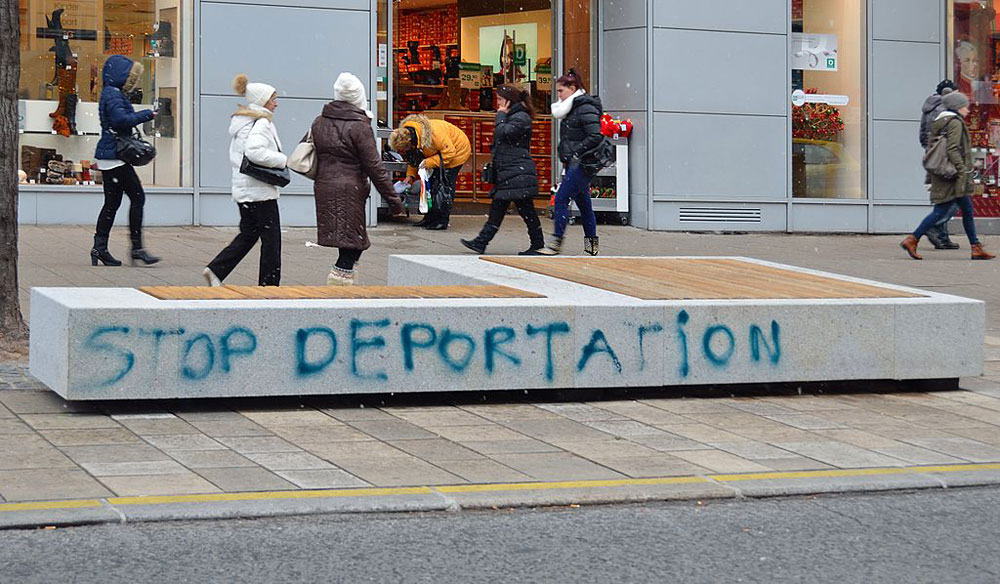
November 11, 2020; The Guardian and The Intercept
Six former patients of Dr. Mahendra Amin, the gynecologist who has been accused of forced sterilization at an immigration center in Georgia, have been deported. Another seven women who have been raising the alarm about medical abuses at the same detention center have received removal notices from the US Immigration and Customs Enforcement (ICE). These cases of retaliation are not isolated; they became the norm under the Trump administration.
The Immigrant Rights Clinic, a human rights organization based at the New York University School of Law, and the New Sanctuary Coalition have been closely following cases of retaliation against immigrant activists. What they found is that the US Department of Homeland Security has been actively targeting immigrants who speak out by surveilling their activities, arresting them, and deporting them.
The number of cases is high enough to have moved advocates to create a database that tracked as many as 1,010 instances of retaliation by different immigration agencies around the country. The retaliation ranges from surveillance, criminal prosecution, and excessive fines to raids in sanctuary cities, detention center retaliation, and deportation.
Freelance journalist Tina Vasquez recounts in detail in a recent interview with The View from Somewhere about the great extent ICE officers went through in October 2018 to trick Samuel Oliver-Bruno away from a sanctuary church to detain and deport him. Samuel was not only fighting for his right to remain in the US with his family, he was leading a sanctuary movement that ICE was bent on breaking. His arrest was just the beginning. A year later, the strategy had become much more sophisticated as seven women leaders of the Colectivo Santuario were served with removal orders and fines as high as $799 per day if they refused to “voluntarily” leave the US.
In an interview with the Intercept, one of the Immigrant Rights Clinic students in charge of mapping these actions against outspoken immigrants explained that the Department of Homeland Security’s powers have expanded to include other federal and local branches of the government.
Sign up for our free newsletters
Subscribe to NPQ's newsletters to have our top stories delivered directly to your inbox.
By signing up, you agree to our privacy policy and terms of use, and to receive messages from NPQ and our partners.
“DHS has taken over a lot of other agencies—like state DMVs, the US Fish and Wildlife Service, state and local police—and used them for its own ends,” he says. “They’re using all of these agencies to expand their authority and making it so that immigrants who live in the US aren’t able to go to those agencies for whatever their actual purposes are.”
High expectations are piling up for the new Biden administration to repair the damage done. Immigration organizations warn, however, that with an ongoing pandemic, immigration policy may not be a high priority for Joe Biden. They are also wary of Obama’s legacy, which encouraged corporate control of immigration detention centers for profit and carried out more deportations than any administration before him. Indeed, while the current administration of Donald Trump has been extreme in its actions, hostility to immigrants long precedes the arrival of Trump on the scene.
On immigration policy, some issues will be easy to roll back through executive orders, such as family separations, the Muslim ban, and the reinstatement of the Deferred Action for Childhood Arrivals (DACA) program. Many policies, however, will require congressional approval. Whether or not Democrats win a US Senate majority depends on the outcomes of Georgia’s runoff elections for two highly coveted seats in January. Indeed, the election results could greatly affect Congressional willingness to accede to legal changes that Biden’s team might request.
Moreover, replacing a culture of criminalizing refugees or undoing the “Remain in Mexico” program that has forced 67,000 people to wait on dangerous refugee camps on the other side of the border will be harder still.
According to a Migration Policy Institute policy paper, creating long-term solutions for a humanitarian migration program that provides easier processing of asylum cases and international cooperation will not be easy, to say the least. It would “prove highly unpopular within an ICE bureaucracy unshackled during the Trump administration.”
That is, if forced sterilization and retribution against women who fled their country thinking that America would provide them a safe harbor can be called “bureaucracy.” It is closer to a system of “mainstreaming hate” against communities of color, harbored at the highest levels of government.—Sofia Jarrin











